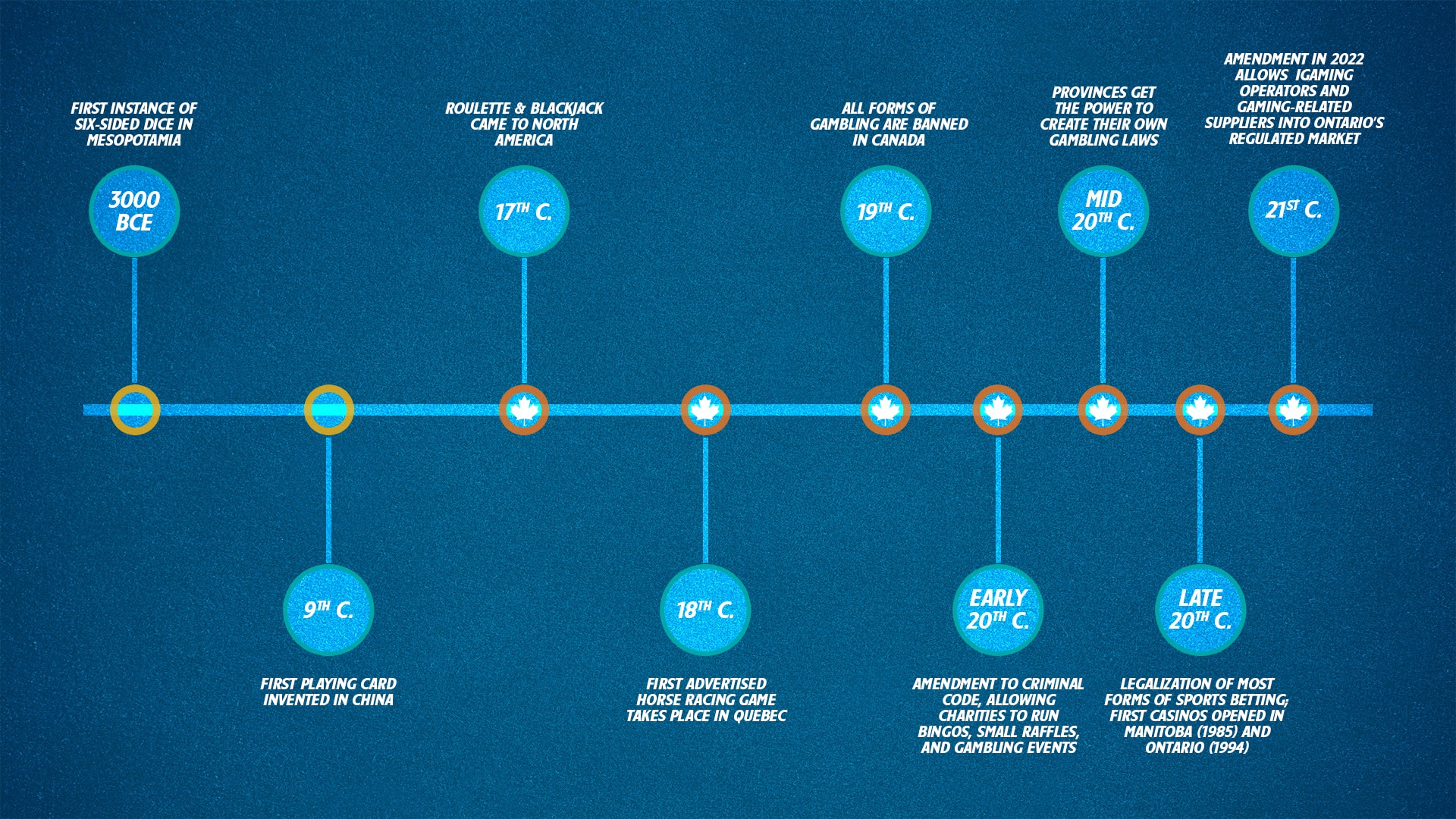Humans have been fascinated with gambling for just about as long as they’ve been around.
Our earliest archaeological evidence of games of chance is a set of six-sided Mesopotamian dice that date back to around 3000 BCE. But David Schwartz’s book “Roll the Bones: The History of Gambling” suggests people have been engaging in gambling since the Paleolithic period, well before written history.
Of course, a lot has changed over the thousands of years since a stone-ager bet his loincloth his pal couldn’t knock a nest out of a tree with a pebble. And as gambling has evolved, so has our understanding of what it means to balance the thrill of a good wager with a bit of common sense – something we now call responsible gambling.
From the first playing cards invented in the 9th century during China’s Tang dynasty to the advent of online gaming in the late 20th century, our repertoire of risk-taking entertainments has steadily developed, along with the rules governing these games to ensure fairness and transparency for players. Let’s take a look at how gambling has changed over the centuries here in Canada.
History of Gambling in Canada (and Ontario)
There’s no firm date marking the first wager made by people living on the land we now call Canada, but you can bet it was long before Columbus sailed the ocean blue – or Vikings visited in their longships, for that matter.
Indigenous groups from the Pacific Northwest have been playing an ancient game called Slahal for thousands of years, according to First Nations’ oral histories, and still play it today. It involves a mix of marked and unmarked pieces that are hidden by one team so that another team must guess their positions.
As folks from overseas created their own settlements and cities, they also imported their culture, including their own forms of gambling. With the world’s first casino established in Italy in 1638 – the infamously snooty Il Ridotto – games such as roulette and blackjack began to make their way into North America during the 17th century.
European horse racing soon became a thing, too. In 1767, soldiers stationed in a garrison in Quebec City held a race on the Heights of Abraham – the first advertised sporting horse race. Ontario wasn’t far behind, with the first commercial horse races taking place in 1793 on a sandy circuit on what is now Toronto Island.
In 1892, the newly created Canadian government banned all forms of gambling, making only minor amendments to the Criminal Code in 1900 to allow charities to run bingos, small raffles, and gambling events to raise funds.
It wasn’t until the second half of the 20th century that the dial began to move on gambling legislation.
In the 1960s, during the heyday of protests for social liberties, outdated gambling taboos were reconsidered and Canadian provinces were finally given authority to regulate gambling to match the unique interests of their people. This paved the way for Wintario – the first lottery game in Ontario – to launch in 1975.
The 1980s saw further movement, with the legalization of most forms of sports betting in 1985 and the opening of a bricks-and-mortar casino in Manitoba. The first Ontario casino – Caesars Windsor – would open five years later in 1994.
Since then, the main advancements in gambling regulation have been related to the rapid growth of technology and the Internet. Ontarians can buy – and even set up subscriptions for – lottery tickets online via OLG’s Direct Pay service, play digital casino games via OLG.ca, and place sports wagers through PROLINE+.
And in 2022, after another federal amendment, Ontario was finally able to offer players one of the simplest types of sports wagers – single-game betting – through Ontario-based bookmakers. This amendment also allowed the Land O’Lakes to become the first province to launch an open (but regulated) online gaming market, allowing private gaming companies to deliver iGaming products to Ontario residents.
Responsible Gambling Has Come a Long Way, Too
As games of chance have evolved, so, too, has our understanding of human behaviour. We have a better picture of how our brains work, why we enjoy taking risks, how to predict outcomes, and how we react to losing and winning. And we’re using that knowledge to help people play responsibly.
Here are four ways PlaySmart can help you play safe:
- My Play Customizer
Worried you might spend more than you can afford? My Play Customizer gives you the power to set yourself a deposit limit for your account, then set spend limits for casino, lottery, and sports play. It’s a smart way to keep yourself from getting carried away in the heat of the moment, and you get to do it on your own terms. - PlaySmart Game Guides
Want to learn the ins and outs of your favourite games? PlaySmart is your gambling encyclopedia, providing straightforward information on rules and odds so you can make smart choices and keep having fun. - PlaySmart Tips
Concerned you might be giving in to your impulses? PlaySmart has tips on how not to cave to peer pressure when wagering on sports, knowing when to cut your losses, and how to approach in-game betting. - My Play History
Want insights on your wagering patterns? Once you’re registered with OLG.ca you can track your play history and identify any behaviours that may be affecting your fun.
These tools are among the many reasons why PlaySmart has twice been named the Best Overall Responsible Gambling Program by the World Lotteries Association.
They’re also part of the reason why you have an advantage over gamblers throughout history. You have all the information you need to play safe and have fun. If our ancestor who wagered on his friend’s pebble-throwing accuracy had had such knowledge, he might not have lost his loincloth.






